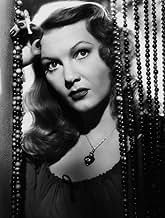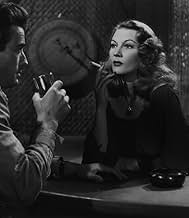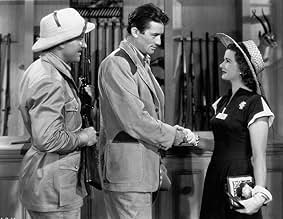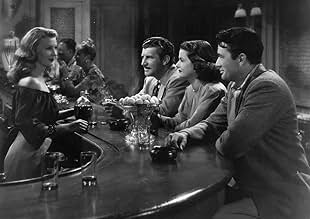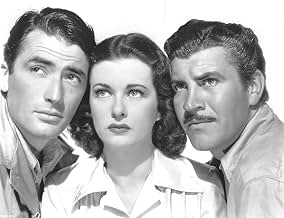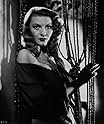In British East Africa, a fatal triangle develops involving a frustrated wife, a weak and cowardly husband, and an English big-game hunter who comes between the couple.In British East Africa, a fatal triangle develops involving a frustrated wife, a weak and cowardly husband, and an English big-game hunter who comes between the couple.In British East Africa, a fatal triangle develops involving a frustrated wife, a weak and cowardly husband, and an English big-game hunter who comes between the couple.
Darby Jones
- Masai Warrior
- (uncredited)
Hassan Said
- Abdullah
- (uncredited)
Martin Wilkins
- Bartender
- (uncredited)
6.6974
1
2
3
4
5
6
7
8
9
10
Featured reviews
White Hunter, Black Hearts
This Zoltan Korda adaptation of Hemingway's bitter tale of big game hunting and marital infidelity is the best movie adaptation of this author's work I have ever seen. Only Gregory Peck seems miscast in what is basically a Trevor Howard part, but this doesn't bring the movie down, it merely limits it. As the superficially charming, boyish, gregarious and basically not very nice Macomber, Robert Preston is brilliant, and he gives a daring, emotionally open performance. Joan Bennett is good as his wife, better than Peck but not perfect casting, either. What makes the movie work is its nasty story, and Casey Robinson's excellent and correct interpretation of it. The Hemingway mood, macho and misogynist, and misanthropic more than anything else, is caught to such perfection one might almost suspect that he was technical adviser (he wasn't). British East Africa is given the Tarzan treatment on screen, typical of the forties but for some difficult to take now. I find that it works, as Tarzan and Hemingway weren't a million miles apart in temperament and values, though I imagine that Tarzan was nicer fellow to get along with.
Game hunters in Africa with naturally a very bad outcome
This is a very turpid Hemingway story, which he must have told out of his own experience as a qualified game hunter in Africa, here acting as a guide (Gregory Peck) for a married couple (Robert Preston and Joan Bennett), the man being very rich and bringing his wife to Africa in a vain effort to impress on her and save their marriage. Of course it turns the other way around. The film starts with his corpse being carried off an airplane and Gregory escorting a very depressed wife down from it, then concentrating on Gregory to deal with the aftermath of the matter in the shape of hangover thoughts, turning to a long flashback, which is the major part of the film. Was it an accident or was it murder? Neither Joan Bennett nor Gregory Peck can anser that question, which will follow you out.
Hunting wild animals, especially when they are of the noble kind like lions, must be perhaps the most despicable sport in the world, especially today, when so many of those finest animals are facing extinction, but this film shows clearly the rotten turpidity and destructive meaninglessness of it as a sport. There is some comfort in that nowadays safari tourists don't shoot animals except by cameras, but there are still abominable poachers around, that should be shot themselves, everyone of them.
Hunting wild animals, especially when they are of the noble kind like lions, must be perhaps the most despicable sport in the world, especially today, when so many of those finest animals are facing extinction, but this film shows clearly the rotten turpidity and destructive meaninglessness of it as a sport. There is some comfort in that nowadays safari tourists don't shoot animals except by cameras, but there are still abominable poachers around, that should be shot themselves, everyone of them.
miscast
From 1947, "The Macomber Affair" is based on a Hemingway short story about a safari. I watched it knowing full well I didn't want to see animals hunted down, so I admit a certain prejudice.
Joan Bennett and Robert Preston are Margaret and Francis Macomber, an unhappy husband and wife who go on a safari guided by hunter Robert Wilson, played by Gregory Peck. Margaret is openly derisive of her husband, whom she considers somewhat of a coward, and he apparently is on this safari to prove his masculinity. It isn't very successful at first, as Francis runs like a rabbit when he's charged by a lion. I don't know who wouldn't, frankly.
Margaret is attracted to Wilson -- again, who wouldn't be, it's Gregory Peck -- and he falls for her. I don't know why because she's a very unpleasant woman. When a tragedy occurs, Wilson has to decide what really happened - was it an accident or deliberate? This film is somewhat miscast, as it required a Peter Finch or Trevor Howard in the Peck role. Peck doesn't come off as much of a big game hunter. Joan Bennett's character is a little too harsh, which I blame on the director, Zoltan Korda. There doesn't seem to be any reason for his attraction to her; she comes off as emasculating.
The film has an ambiguous ending. I didn't care how it ended, which is a major problem -- you should be invested in the characters.
This is an old-fashioned macho Hemingway story that received better treatment than most of his work. Still -- Hemingway is very difficult to film due to his spare language and all that subtext.
If you like seeing animals shot and killed (though I realize they really weren't) so someone can prove his masculinity, this is the movie for you.
Joan Bennett and Robert Preston are Margaret and Francis Macomber, an unhappy husband and wife who go on a safari guided by hunter Robert Wilson, played by Gregory Peck. Margaret is openly derisive of her husband, whom she considers somewhat of a coward, and he apparently is on this safari to prove his masculinity. It isn't very successful at first, as Francis runs like a rabbit when he's charged by a lion. I don't know who wouldn't, frankly.
Margaret is attracted to Wilson -- again, who wouldn't be, it's Gregory Peck -- and he falls for her. I don't know why because she's a very unpleasant woman. When a tragedy occurs, Wilson has to decide what really happened - was it an accident or deliberate? This film is somewhat miscast, as it required a Peter Finch or Trevor Howard in the Peck role. Peck doesn't come off as much of a big game hunter. Joan Bennett's character is a little too harsh, which I blame on the director, Zoltan Korda. There doesn't seem to be any reason for his attraction to her; she comes off as emasculating.
The film has an ambiguous ending. I didn't care how it ended, which is a major problem -- you should be invested in the characters.
This is an old-fashioned macho Hemingway story that received better treatment than most of his work. Still -- Hemingway is very difficult to film due to his spare language and all that subtext.
If you like seeing animals shot and killed (though I realize they really weren't) so someone can prove his masculinity, this is the movie for you.
Hemingway would have appreciated this journey
The writing team of Casey Robinson and Seymour Bennett adapted Ernest Hemingway's "the Short Happy Life of Francis Macomber" into a solid screenplay which enlarged upon the subtle themes of the original. A wealthy couple(Robert Preston,Joan Bennett) arrive in East Africa ostensibly for a safari vacation but it soon becomes apparent that they are ill-matched and resentful of each other's failings.Their safari guide,Gregory Peck,attempting to conduct things professionally,becomes an unwilling spectator to their petty arguments and vicious insults.But as the party trek through the jungle in search of game the true personalities of the warring couple emerge playing havoc with Peck's sympathies and his growing interest in beautiful Bennett.An ironic twist of events await these adventurers as they pursue game more dangerous than they bargained for. An enriching score by Miklos Rozsa,the superb direction by Hungarian director Zoltan Korda,and fine performances by the 3 principals(especially Preston's paranoid tycoon) all serve the viewer with a gripping drama.
Absorbing Hemingway Drama
This film deserves a DVD release. Excellent script, direction, and editing carry the film into Hemingway's world. The results are excellent. The three leads do very well with their parts. I particularly liked Joan Bennett. Her cynicism and brazen effrontery towards husband Preston held my attention as she carried on an obvious affair with Peck. The dynamic between the three stars smolders across the screen as Preston attempts to "prove" his manhood by killing wild beasts. In true Hemingway style the "big game" adventure turns into one of more human proportions. Pretty bold stuff considering the Production Code was still in full swing. Reginald Denny plays with authority in a minor role.
Did you know
- TriviaFor the African scenes, Reginald Denny invented the first radio-controlled model airplane and, with Osmond Borradaile, put a camera on board in 1946.
- GoofsWhen Margaret and Robert start out on their safari driving across the country, in close shots they are shown looking out the right side of their truck at wildlife, but the shots of the animals they are presumably viewing are taken out the left side of a moving vehicle.
- ConnectionsFeatured in O ziliarogatos (1956)
- How long is The Macomber Affair?Powered by Alexa
Details
- Release date
- Country of origin
- Language
- Also known as
- The Great White Hunter
- Filming locations
- Tecate, Baja California Norte, Mexico(doubling for the African Veldt)
- Production company
- See more company credits at IMDbPro
- Runtime
- 1h 29m(89 min)
- Color
- Aspect ratio
- 1.37 : 1
Contribute to this page
Suggest an edit or add missing content


